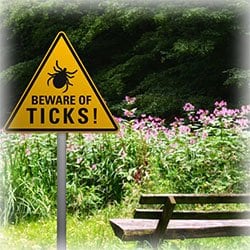Signs That a Tick Is Making You Sick
 Ticks can transmit serious diseases, so look out for these symptoms.
Ticks can transmit serious diseases, so look out for these symptoms.
Do you love spending time outdoors at this time of year? Ticks are most active during the warmer months of the year, and depending on where you live, you may come in contact with ticks that can make you sick.
According to Michael Galbreath MD, a PIH Health family medicine physician: "Tick bites can range from mild to severe, creating a variety of symptoms including rash, fever, soreness, swelling, headaches, and fatigue. Therefore, it's important to be aware and vigilant when outdoors to prevent a tick bite, and if bitten, seek medical attention if you start exhibiting certain symptoms."
Here are answers to some common questions about ticks, including where you’ll find them, what types of illnesses they may cause, and how you can protect yourself.
Where do ticks live?
Ticks live in different habitats, including grassy, bushy, wooded, and sandy areas. They mostly live in areas populated by animals like deer, rodents, birds, and other mammals. Ticks prefer damp, shaded locations and places with dense vegetation. They commonly lurk in grassy, wooded, and bushy areas with easy access to their hosts.
Can all ticks make you sick?
There are different species of ticks, and only some transmit various kinds of bacteria, viruses, or parasites that can make you sick. Some tick-transmitted diseases can be serious, so if you feel sick after being bitten by a tick, be sure to see a doctor right away. Even if you don’t remember getting bitten but have been in an area where ticks commonly live, get checked by a doctor if you exhibit signs of a tick-borne illness.
What kinds of illnesses do ticks transmit?
The most common disease associated with ticks is Lyme disease, but it’s not the only one. According to the Centers for Disease Control and Prevention, ticks in the U.S. may transmit:
- Anaplasmosis
- Babesiosis
- Borrelia mayonii
- Borrelia miyamotoi
- Bourbon virus
- Colorado tick fever
- Ehrlichiosis
- Heartland virus
- Powassan disease
- Rickettsia parkeri rickettsiosis
- Rocky Mountain spotted fever
- Southern tick-associated rash illness
- Tick-borne relapsing fever
- Tularemia
- 364D rickettsiosis
These illnesses are transmitted by different ticks and may only be found in specific regions of the country.
What are signs that you may have a tick-borne illness?
Although different illnesses transmitted by ticks each have their own symptoms, many have similar symptoms. If you develop any of these symptoms after getting bitten by a tick, see a doctor:
- Fever/chills
- Headache
- Muscle aches
- Joint pain
- Fatigue
- Rash
- Weakness or paralysis
How can you protect yourself from getting sick from a tick?
The best way to avoid getting a tick-borne illness is to protect yourself from getting bitten.
- Take precautions where ticks are commonly found, and avoid wooded, grassy, and brushy areas.
- Wear long pants and closed shoes, with your pants tucked into your socks. Also, wear long-sleeve shirts.
- Treat your clothing, shoes, and gear with products containing 0.5% permethrin.
- Spray your skin with insect repellant containing DEET, picaridin, IR3535, Oil of Lemon Eucalyptus (OLE), para-menthane-diol (PMD), or 2-undecanone.
- Check your clothing and gear for ticks. Tumble dry clothing on high heat for at least 10 minutes to kill any ticks you may have missed. Also, check pets carefully.
- Take a shower and do a tick check. Carefully look at every part of your body, using a mirror if necessary. Ticks can be hard to spot and may be hiding in places that are not easy to see, such as behind your ears, in your hair, under your arms, or between your legs.
- The faster you remove a tick, the less likely you are to get sick. If a tick has bitten you, use tweezers to grasp the tick firmly by its head near your skin and pull it straight out with a slow and steady motion. Make sure not to leave the head embedded in the skin.
It's important to be aware of the different symptoms of tick-borne illnesses as well as precautions you can take to protect yourself and your family. Be familiar with the habitats of ticks and take appropriate steps to protect yourself from being exposed to them. Tick-borne diseases can be serious, so make sure to take the necessary measures to keep yourself safe. If you have been bitten by a tick and are exhibiting any of the above symptoms, seek medical attention. Make an appointment with a PIH Health physician or visit a local PIH Health Urgent Care Center.
Copyright 2023 © Baldwin Publishing, Inc. Health eCooks® is a registered trademark of Baldwin Publishing, Inc. Cook eKitchen™ is a designated trademark of Baldwin Publishing, Inc. Any duplication or distribution of the information contained herein without the express approval of Baldwin Publishing, Inc. is strictly prohibited.